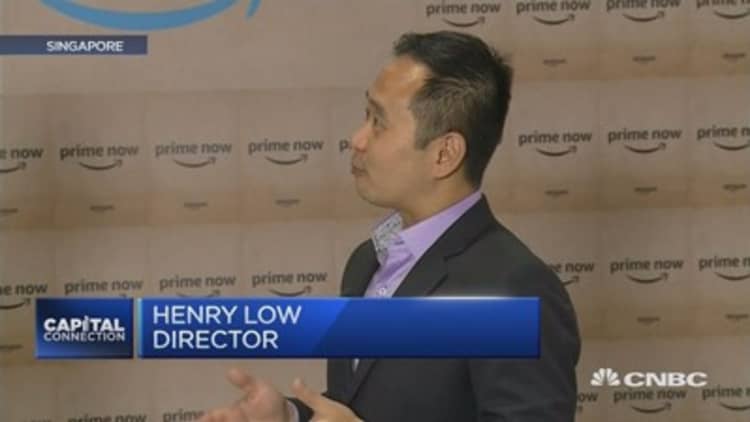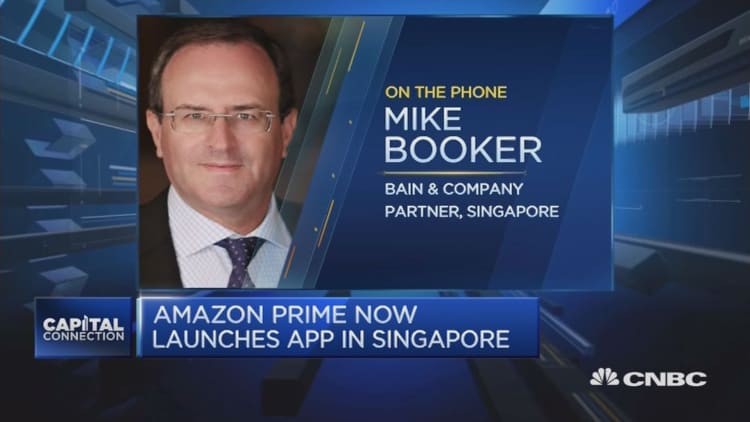
Amazon launched its express, same-day delivery services, Prime Now, on Thursday in Singapore, making it the e-commerce giant's first foray into the Southeast Asian market.
Prime Now will allow Singapore users to place orders for fast delivery on a variety of items, including beer, beverages, milk, eggs, fresh produce, dried goods, consumer electronics, toys and baby products.
The app was made available for download on Wednesday night in Singapore, both on Google's Play store and Apple's App store. Prime Now is part of Amazon's Prime membership service and was launched in December 2014 in New York. To-date, the service is available in more than 50 cities in nine countries, including Berlin, London, Madrid, Rome and Tokyo.
What's brewing is a war, a massive face-off between Alibaba and Amazon.Ken MandelPresident for innovation and commerce in Asia Pacific at Publicis Media
There are several delivery options given: For orders below 40 Singapore dollars ($29.48), users pay a S$5.99 delivery fee; orders above S$40 are delivered free in a two-hour delivery window. For those wanting to get their goods within an hour, they pony up S$9.99 per order.
"Prime Now is Amazon's fastest delivery method yet," Henry Low, director of Prime Now for Asia Pacific at Amazon, told CNBC. "What we've done is we have looked at what our Singapore consumers love to have ... (and) we've worked with hundreds of local vendors and made (them) available."
Though Prime Now is a service that is available only to Prime members, Low said Amazon was making this available to non-members in Singapore for a limited period of time, letting customers try the service for free. He also said that the company was working to launch the Amazon Prime membership service soon in Singapore, but he declined to specify a timeline.
Setting up for a showdown
Amazon's entry into Southeast Asia had been heavily anticipated since it was first reported last year. Analysts said Singapore's relative affluence and westernization, as well as good infrastructure, made the country a prime candidate for Amazon's expansion.
"The primary reason Amazon picked Singapore as its first market in Southeast Asia is due to the fact that consumers here are more westernized and affluent, and many of them are already shopping overseas," Xiaofeng Wang, a senior analyst at market research company Forrester, said in a statement.
The foray into Singapore sets up the stage for a potential showdown between Amazon and Chinese tech rival Alibaba, which recently took a controlling stake in regional e-commerce company Lazada. The investment opened up Alibaba's global footprint in markets like Indonesia, Malaysia, the Philippines, Singapore, Thailand and Vietnam and made it accessible to approximately 23 million active buyers on the Lazada platform.

Last year, Lazada bought Singapore-based online grocer RedMart for an undisclosed sum. RedMart provides online grocery shopping to customers in Singapore, from fresh produce to frozen foods within two-hour delivery windows — a direct competition to the Prime Now service in the city-state.
More recently, it was reported that Alibaba was also considering a possible stake in Indonesian e-commerce player Tokopedia.
"What's brewing is a war, a massive face-off between Alibaba and Amazon," Ken Mandel, president for innovation and commerce in Asia Pacific at Publicis Media told CNBC. "Because Alibaba owns Lazada, they are going to certainly be a force to be reckoned with."
The main thing to watch here is this sort of war where they're testing all their new weapons against each other, and they can hone those.Mike BookerPartner at Bain & Company, on Amazon facing off against Alibaba through Lazada
Earlier this month, CNBC spoke to Lazada co-founder Aimone Ripa di Meana who said the company was confident about taking on Amazon's eventual expansion into Southeast Asia. According to Meana, Lazada's advantages include on-the-ground knowledge about each of the six regional markets in which it operates, an extensive logistics network and backing from Jack Ma.
To be sure, analysts point out that Amazon also has its strengths. Forrester's Wang said a crucial advantage for Amazon is "in the strength of U.S. products/brands and (electronic) books, etc." She added that Amazon Prime is also an "attractive loyalty program that has worked in the U.S., but how it localizes to meet the needs of customers here will be the key to success."
Localization is often a topic analysts and experts bring up when talking about global companies succeeding in Southeast Asia's hugely diverse local markets. Amazon's Prime Now directors in Singapore, Low and also Aarif Nakhooda, are natives to the city-state.
A lucrative $200 billion market
Southeast Asia is a lucrative market for e-commerce as millions of first-generation internet users are starting to embrace online shopping. A frequently cited study from Google and Singapore investment firm Temasek Holdings predicted the region's internet economy to grow to $200 billion by 2025, driven mostly from growth in e-commerce.
Its proximity to China, which has already become a leading market for e-commerce, also makes the region Alibaba's "backyard," according to Forrester Senior Forecast Analyst Satish Meena.
"[Alibaba wants] to be the major player in this market, beating Amazon. When it comes to a direct battle between these two, Alibaba doesn't have many countries left where they can actually take a lead," Meena told CNBC, adding that those markets are still at a relatively early stage of development for e-commerce.
Among markets outside the United States and China, Meena explained that Amazon already had a sizable presence in Europe and was also doing well in the Indian market. Indeed, local media reported earlier this month that Amazon had invested more than $2 billion to-date in their India operations.
But Meena said it is unlikely that Amazon will invest as aggressively in Southeast Asia as it has done in India. Instead, they are likely to test the waters in one or two markets to grow the business and and gain customers.
"They will take their time, increasingly grow their investment in logistics, warehousing and everything. So that they can gain the customers and gain them for a long time," he said.
Amazon's Low said the company isn't thinking about what its competitors are doing. Instead, its focus is on the consumers, he said.
"We look at what customers and consumers would like to have, and then from there on we would develop and invent systems and products which will solve customer problems. In the Prime Now case, it's really the convenience angle they were trying to solve," he said.
Low declined to say what Amazon's next market could be in the region.
The real winner
In the end, analysts agree that the biggest beneficiary from the Amazon and Alibaba rivalry will be the consumers.
"The first thing people need to realize is that this is one of the first markets that Amazon and Alibaba are going to go head-to-head ... it's going to be a win-win for the consumers in Singapore," Mike Booker, a partner at Bain & Company, told CNBC's "Capital Connection" on Thursday.

He said that the headroom for the e-commerce market in Singapore is huge as online commerce comprises only a small percentage of overall retail in the city-state. While the consumers are going to win, Booker said some of the incumbent offline retailers could lose as a result of the showdown.
Booker added that this is an opportunity for Amazon to test its wares against an Alibaba company: "The main thing to watch here is this sort of war where they're testing all their new weapons against each other, and they can hone those," he said.


